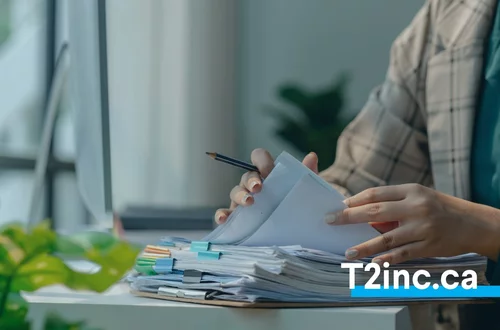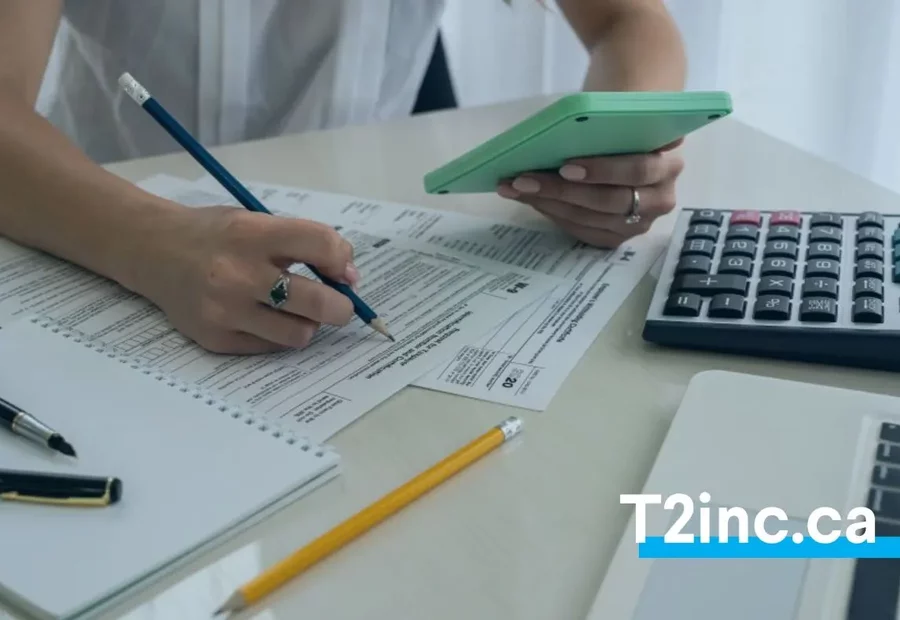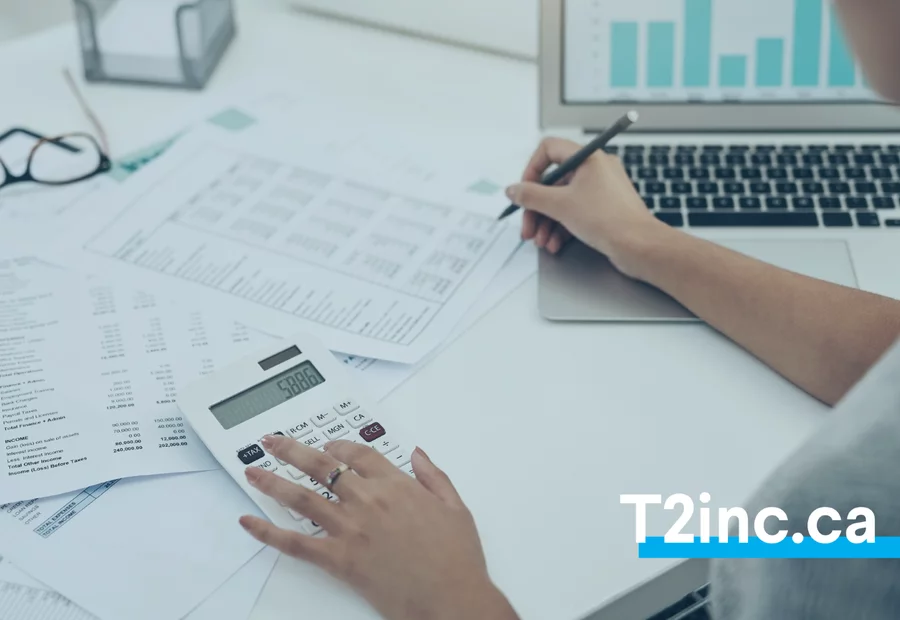How long to keep business tax records & accounting documents in Canada?

When you run a business in Quebec or anywhere in Canada, it’s easy to accumulate boxes full of documents: invoices, bank statements, tax returns, contracts... But how long do you need to keep your tax records? Is it six years, ten years, or even longer? And what about electronic records?
Whether you're managing an incorporated SME or are self-employed, understanding how long to save your tax documents is essential to comply with Canadian tax laws. Proper records must be kept for a defined period to avoid penalties if you're audited by the Canada Revenue Agency (CRA) or Revenu Québec.
In this article, our tax accountants explain clearly and simply the durations to be respected for each type of document, the specific federal and provincial rules, and how to organize yourself efficiently to stay compliant.
Why keeping proper tax records is essential
Tax and accounting records are more than just paperwork. They are essential supporting documents if the CRA or Revenu Québec ever audits your business. Your records must prove the accuracy of your income, expenses, tax credits, and deductions claimed under the Income Tax Act.
Here are some examples of documents to keep:
- Your T2 or CO-17 tax returns ;
- Invoices sent to your customers;
- Business expense receipts;
- Business bank statements;
- Company vehicle travel and expense records, with supporting documents;
- Service or rental contracts;
- Records showing the names of your employees as well as their salaries and any deductions made from their wages;
- Federal and provincial notices of assessment (NOA);
- Any document concerning an asset, a deduction, or an accounting transaction.
These documents are essential for establishing your accounting balance sheet, calculating your deductions, and avoiding tax errors. Keeping your records also allows you to respond to internal requests (expense verification, warranty, etc.), or insurance (warranty certificates, policies).
How long to keep your tax records & accounting documents in Canada?
In Canada, whether at the federal or provincial level, tax laws set specific retention periods for business and tax documents. These rules ensure that, in case of an audit, you are able to provide all the necessary documentation to support your tax filings.
Let's explore the general rules you must follow.
CRA’s General Rule: Keep tax Records for six years
According to the Canada Revenue Agency (CRA), you must keep your tax records for at least six years from the end of the last tax year they relate to.
This applies to all taxpayers, whether you are incorporated or self-employed.
For example: If your 2023 tax year ends on December 31, you must keep your records until December 31, 2029.
Important details to remember:
- The six-year retention period starts after the year you file your return;
- If you filed a late return, the period begins on the actual filing date;
- If you amend a return (e.g., after an audit or objection), the retention period restarts from the amendment date.
Revenu Québec's provincial rules: Similar to CRA’s
Revenu Québec generally applies the same retention rules for businesses operating in Quebec. This means you must keep your business records (tax receipts, payroll registers, financial statements) for at least six years after the end of the tax year they relate to.
However, certain documents should be kept indefinitely to protect your company’s legal structure and historical records.
This applies to :
- Sales and purchase invoices ;
- bookkeeping ;
- GST/QST tax receipts ;
- Payroll records;
- Financial statements.
Accounting and corporate records to keep indefinitely
While most tax and accounting records must be kept for six years, we strongly recommend retaining some corporate documents for the lifetime of your company.
We encourage you, for example, to keep the following corporate documents indefinitely:
- Articles of Incorporation and Notarial Deeds;
- Minutes of meetings of the Board of Directors and shareholders;
- Share certificates and records of share transfers;
- Any supporting documents used to justify entries in the general ledger.
If your company is dissolved, you must keep all original corporate documents for at least two years after the date of dissolution.
Documents to keep beyond six years (on request)
In certain situations, the Canada Revenue Agency (CRA) or Revenu Québec may require you to retain some business documents for a longer period.
However, if this is the case, a representative of the tax authorities will contact you directly, or send you a letter by registered mail, with this information. In this exchange, you will be informed of the nature of the business document and the requested retention period.
Which documents should I keep, and for how long?
Here's a summary of the most common deadlines:
| Type of Document | Minimum Retention Period |
|---|---|
| T2/CO-17 Corporate Tax Returns | 6 years |
| Accounting Records (journals, ledgers) | 6 years |
| Invoices and Receipts | 6 years |
| Payroll Records and Deductions | 6 years |
| Commercial Contracts | End of contract + 6 years |
| Fixed Asset Documents (e.g., property or equipment purchase) | Asset life + 6 years |
| Articles of Incorporation, By-laws, Shareholder Resolutions | Indefinitely |
If you close your business, you must keep all records and supporting documents for at least two years after the date of dissolution. This obligation also applies if you dispose of property or assets, proper documentation must be available until the end of the last tax year they relate to.
Can you keep tax records electronically?
Yes, absolutely! The CRA and Revenu Québec allow you to save your tax documents electronically, provided the following conditions are met:
- The electronic records are legible and accessible at all times;
- They are authentic and unalterable, ensuring data integrity;
- They are securely stored, preferably on servers located in Canada or in compliance with Canadian tax laws.
Our tax accountants recommend using trusted online scanning and filing tools. Make regular backups to ensure your electronic tax records are protected against loss or damage. Maintaining proper electronic records is essential to meet CRA and Revenu Québec requirements, especially with the increasing reliance on cloud-based bookkeeping systems.
What happens if you don't keep your canadian tax records?
Failure to comply with retention obligations can be costly:
Tax penalties for failing to maintain proper records;
Arbitrary assessments of your taxable income by the CRA;
Loss of deductions and tax credits you might otherwise claim;
Refusal of claims or expenses during audits or objections;
- Legal and financial risks if disputes arise with customers or suppliers.
In short, not having the right documents at the right time could cost your business valuable time, money, and credibility. Keeping your records for at least six years, and beyond when required, is crucial to protecting your business under Canadian tax laws.
Best practices for organizing and retaining your tax documents
- Organize records by tax year to simplify retrieval;
- Keep both physical and electronic copies whenever possible;
- Clearly name your files (e.g. "Invoice-Client-X_2023-04.pdf") ;
- Use a bookkeeping software with document management and archiving features;
- Schedule annual reminders to check your archives.
T2inc.ca helps you stay compliant... without the stress
Keeping accounting and tax records is more than just a legal obligation. It's also a good management reflex and a way of avoiding costly mistakes. By respecting the recommended retention periods, you protect your business in the event of an audit... and gain peace of mind.
Need professional support for your tax and accounting needs? Call on T2inc.ca for simple, compliant management adapted to your company's reality.
- Why keeping proper tax records is essential
- How long to keep your tax records & accounting documents in Canada?
- Accounting and corporate records to keep indefinitely
- Documents to keep beyond six years (on request)
- Which documents should I keep, and for how long?
- Can you keep tax records electronically?
- What happens if you don't keep your canadian tax records?
- Best practices for organizing and retaining your tax documents
- T2inc.ca helps you stay compliant... without the stress
Contact our experts
Have a question? Need help? Fill out our online form to get help from our experts.
Contact usNeed more help?
Contact us by filling out our form
Are you interested in our services, but would like more information before taking the plunge? Contact us today and one of our tax accountants will be in touch to help you.
At T2inc.ca, we're committed to helping business owners manage their company's tax affairs so they can grow their business.




